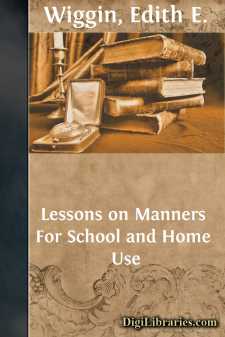Categories
- Antiques & Collectibles 13
- Architecture 36
- Art 48
- Bibles 22
- Biography & Autobiography 813
- Body, Mind & Spirit 142
- Business & Economics 28
- Children's Books 15
- Children's Fiction 12
- Computers 4
- Cooking 94
- Crafts & Hobbies 4
- Drama 346
- Education 46
- Family & Relationships 57
- Fiction 11828
- Games 19
- Gardening 17
- Health & Fitness 34
- History 1377
- House & Home 1
- Humor 147
- Juvenile Fiction 1873
- Juvenile Nonfiction 202
- Language Arts & Disciplines 88
- Law 16
- Literary Collections 686
- Literary Criticism 179
- Mathematics 13
- Medical 41
- Music 40
- Nature 179
- Non-Classifiable 1768
- Performing Arts 7
- Periodicals 1453
- Philosophy 64
- Photography 2
- Poetry 896
- Political Science 203
- Psychology 42
- Reference 154
- Religion 513
- Science 126
- Self-Help 84
- Social Science 81
- Sports & Recreation 34
- Study Aids 3
- Technology & Engineering 59
- Transportation 23
- Travel 463
- True Crime 29
Lessons on Manners For School and Home Use
by: Edith E. Wiggin
Description:
Excerpt
INTRODUCTION.
It is true that good manners, like good morals, are best taught by the teacher's example. It is also true that definite lessons, in which the subject can be considered in its appropriate divisions, are of no little value if we would have our children attain to "that finest of the fine arts, a beautiful behavior."
Such lessons should be as familiar and conversational as possible. They ought to be talks rather than lectures; and the children should be encouraged to do a large part of the talking. Children that come from homes where good manners are taught and practised, will be glad to repeat the precepts of politeness learned in the home circle; and those less favored will not want to be behind in this hitherto unstudied branch. We must remember that many children hear no mention of politeness outside the school-room, and are uncouth and rude, not so much because they choose to be, as because they do not know how to be otherwise.
I have used in my own schools of different grades a series of simple lessons, varying both matter and method according to the age and capacity of scholars. The good results have been marked, not only in the school-room, but at home and in public places; and years afterwards scholars have expressed their grateful appreciation of this instruction and its value to them in every-day life. I have thought that the publication of these outline lessons might be a help to other teachers also, in the way of offering suggestions and saving time in preparing lessons for their own classes.
For some classes the lessons as arranged in this little book may be too long, for others too short. They are outlines merely, to be filled in and supplemented by each teacher, adding to, taking from, and varying them at her discretion.
It may seem unnecessary to touch upon such simple things as some that are spoken of. The teacher, perhaps, cannot remember when these axioms were not familiar to her; but let her put questions to the children concerning them, and she will find in many schools that to half the pupils she is talking in an unknown tongue. Matters are mentioned which do not concern them now so much as they will a few years later; as, for instance, conduct at places of amusement and in company; but in these things, as in their school studies, boys and girls are learning now for the future.
My plan would be to have a familiar talk with the children one day, drawing from them, as far as it can be done, the rules of behavior which the teacher wishes to impress upon them. When she can illustrate a point by a story, the impression will be deepened. It is well also to speak of acts which have come under the teacher's eye in the school-room, on the play-ground, or on the way to school, and let the children decide whether these were polite or impolite, and why. This will make the whole matter more real to them, and, if they are encouraged to furnish illustrations, they will open their eyes and find them in their own little worlds. We want our children in school, from the youngest to the oldest, to notice a breach of politeness as quickly as an error in recitation....


